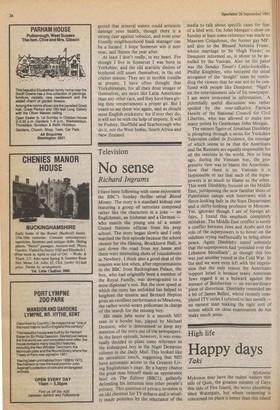Television
No sense
Richard In grams I have been following with some enjoyment the BBC's Sunday thriller serial Blood Money. The story is a standard kidnap one featuring a group of terrorists composed rather like the characters in a joke — an Englishman, an Irishman and a German — who snatch the young son of a senior United Nations official from his prep school. The story began slowly and I only watched the first episode because the school chosen for the filming, Brockhurst Hall, is just down the road from my home and there were interesting shots of roundabouts in Newbury. I think also a good deal of the tension was lost when, after representations to the BBC from Buckingham Palace, the boy, who had originally been a member of the Royal Family, was downgraded to a mere diplomat's son. But the slow speed at which the story has unfolded has helped to heighten the tension and Bernard Hepton gives an excellent performance as Meadows, the rather world-weary policeman in charge of the search for the missing boy.
His main bête noire is a smooth MI5 man in a bowler hat, played by Michael Denison, who is determined to keep any mention of the story out of the newspapers. In the latest episode, however, it was eventually decided to plant some reference to the kidnapped boy in the Nigel Dempster column in the Daily Mail. This looked like an unrealistic touch, suggesting that MI5 have automatic access to the Greatest Living Englishman's page. By a happy chance the great man himself made an appearance later on The Editors (BBCI), gallantly defending his intrusion into other people's privacy. This question of privacy invasion is an old chestnut for TV debates and is usually made pointless by the reluctance of the media to talk about specific cases for fear of a libel writ. On John Morgan's show on Sunday at least some reference was made to Maureen Colquhoun, the former gay MP, and also to the Blessed Antonia Fraser, whose marriage to Sir Hugh Fraser, so Dempster informed us, is about to be annulled by the Vatican. Also on the panel was the Sunday Times's Lenin-lookalike, Phillip Knightley, who betrayed the usual arrogance of the 'Insight' team by reminding the viewers that he was not to be confused with people like Dempster: `Nigel's on the entertainment side of his newspaper. I am more interested in information.' A potentially useful discussion was rather spoiled by the over-talkative Patricia Hewitt of the National Council for Civil Liberties, who was allowed to make too many points by Gentleman John Morgan.
The earnest figure of Jonathan Dimbleby is ploughing through a series for Yorkshire Television called In Evidence, the message of which seems to be that the Americans and the Russians are equally responsible for all the tensions in the world. Not so long ago, during the Vietnam war, the progressive view was to blame the Americans. Now that there is no Vietnam it is fashionable to say that each of the superpowers is as much to blame as the other. This week Dimbleby focused on the Middle East, juxtaposing the now familiar shots of Palestinian camps with interviews with a fierce-looking lady in the State Department and a shifty-looking professor in Moscow. Yet, ignorant though I am of foreign affairs, I found this emphasis completely mistaken. The Middle East conflict is surely a conflict between Jews and Arabs and the role of the superpowers is to hover on the sidelines trying ineffectually to bring about peace. Again Dimbleby stated solemnly that the superpowers had 'presided over the Lebanese bloodbath', as though this too was just another round in the Cold War. In the end we were even left with the impression that the only reason the Americans support Israel is because many American Jews regard it as a bulwark against the menace of Bolshevism — an extraordinary piece of distortion. Dimbleby reminded me a bit of James Bellini, whose recently completed ITV series I referred to last month — an earnest man making the right sort of noises which on close examination do not make much sense.


































 Previous page
Previous page